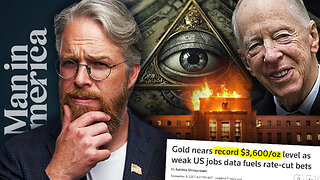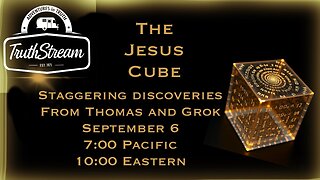Premium Only Content

Hidden Tribes: The Appeal of Motivated Reasoning
Exposing The Appeal of Motivated Reasoning
How did you come to believe in everything that makes you, you? Did you feel the sneaky appeal of motivated reasoning, or did it take you by surprise? It used to be that scientists figured people made decisions about the world and their beliefs in a fact-based way. But that… doesn’t seem to be the case. Most people’s brains pick through available information, discard whatever causes unpleasant emotions, and keeps whatever creates the most comfortable version of reality imaginable. Reason, even for those most highly trained in science and mathematics - seems to be much more about tribal, emotional ties than it is about just the facts.
ªº¬˚∆≤≥≤≥ Join the mailing list http://eepurl.com/gRUCZL ≤≥≤≥∆˚¬ºª
Join us on a journey to the inner workings of the human mind, the hidden appeal of incentive-driven reasoning, and a few suggestions for how to stay away from these cognitive traps. Stick around for part 2, where we speak with Dr. Christopher French, professor of Anomalistic Psychology at the University of London.
ªº¬˚∆≤≥≤≥ Subscribe & Ring the bell to study the Secrets of the Universe ≤≥≤≥∆˚¬ºª
PODCAST INFO:
Blog: http://demystifyingscience.com/blog
Apple Podcasts: https://apple.co/3uhn7J1
Spotify: https://spoti.fi/39IDJBD
RSS: https://anchor.fm/s/2be66934/podcast/rss
Full episodes playlist: https://bit.ly/3sP1WgR
Clips playlist: https://bit.ly/2OieYEG
Donate: rb.gy/a7ueoz
Swag: https://bit.ly/2PXdC2y
SOCIAL:
- Twitter: https://twitter.com/demystifysci
- Facebook: https://www.facebook.com/groups/demystifyingscience
- Instagram: https://www.instagram.com/demystifysci/
We wrote and performed the music in this episode!
Shilo Delay: https://soundcloud.com/laterisgone
And everywhere else (Spotify, etc..)
https://g.co/kgs/fc8WbA
#MotivatedReasoning #CognitiveDissonance #TribalPsychology
ESSAY REFERENCES:
Aarnio, K., & Lindeman, M. (2005). Paranormal beliefs, education, and thinking styles. Personality and Individual Differences, 39(7), 1227–1236. https://doi.org/10.1016/j.paid.2005.04.009
Bodenmann, T., & Hirsch Hadorn, G. (2014). How understanding causal relations counts in criticising arguments against anthropogenic global climate change. Meteorologische Zeitschrift, 23(1), 5–14. https://doi.org/10.1127/0941-2948/2014/0460
Boykoff, M. T., & Boykoff, J. M. (2004). Balance as bias: global warming and the US prestige press. Global Environmental Change, 14(2), 125–136. doi:10.1016/j.gloenvcha.2003.10.001
Cherniak, C., Nisbett, R., & Ross, L. (1983). Human Inference: Strategies and Shortcomings of Social Judgment. The Philosophical Review, 92(3), 462. doi:10.2307/2184495
Cory J. Clark & Bo M. Winegard (2020) Tribalism in War and Peace: The Nature and Evolution of Ideological Epistemology and Its Significance for Modern Social Science, Psychological Inquiry, 31:1, 1-22, DOI: 10.1080/1047840X.2020.1721233
Epley, Nicholas, and Thomas Gilovich. 2016. "The Mechanics of Motivated Reasoning." Journal of Economic Perspectives, 30 (3): 133-40.
Festinger, Leon; Henry W. Riecken; Stanley Schachter (1956). When Prophecy Fails: A Social and Psychological Study of a Modern Group that Predicted the Destruction of the World. University of Minnesota Press. ISBN 1-59147-727-1. Reissued 2008 by Pinter & Martin with a foreword by Elliot Aronson, ISBN 978-1-905177-19-6
Festinger, L., & Carlsmith, J. M. (1959). Cognitive consequences of forced compliance. The Journal of Abnormal and Social Psychology, 58(2), 203–210. doi:10.1037/h0041593
Festinger, Leon (October 1962). "Cognitive Dissonance". Scientific American. 207 (4): 93–106. doi:10.1038/scientificamerican1062-93
Gilbert, D. T., Tafarodi, R. W., & Malone, P. S. (1993). You can’t not believe everything you read. Journal of Personality and Social Psychology, 65(2), 221–233.
Haidt, J. (2017). Viewpoint diversity in Academia. https://jonathanhaidt.com/viewpoint-diversity/
Kahan, D. M. (2012). Ideology, motivated reasoning, and cognitive reflection: An experimental study. Judgment and Decision making.
Kahan, Dan M., (May 24, 2017). Misconceptions, Misinformation, and the Logic of Identity-Protective Cognition. Yale Law & Economics Research Paper No. 575.
Linder, D. E., Cooper, J., & Jones, E. E. (1967). Decision freedom as a determinant of the role of incentive magnitude in attitude change. Journal of Personality and Social Psychology, 6(3), 245–254.
Morewedge, C. K., Yoon, H., Scopelliti, I., Symborski, C. W., Korris, J. H., & Kassam, K. S. (2015). Debiasing Decisions. Policy Insights from the Behavioral and Brain Sciences, 2(1), 129–140.
Paterson, N. R. (2011). Global Warming: A Critique of the Anthropogenic Model and its Consequences. Geoscience Canada
Van Prooijen, J.-W., Klein, O., & Milošević Đorđević, J. (2020). Social-cognitive processes underlying belief in conspiracy theories. In M. Butter & P. Knight (Eds.), Handbook of Conspiracy Theories
-
 LIVE
LIVE
SpartakusLIVE
7 hours agoVerdansk Duos w/ Nicky || Saturday Spartoons - Variety Later?!
313 watching -
 LIVE
LIVE
Badlands Media
21 hours agoDevolution Power Hour Ep. 387
6,978 watching -
 1:05:23
1:05:23
Man in America
10 hours agoSoaring Gold Exposes the Imminent Crash of the Old System w/ John Perez
24.9K2 -
 LIVE
LIVE
TruthStream with Joe and Scott
11 hours agoTHOMAS AND GROK: AI, Bible decodes, The JESUS Cube live 9/6: 7pm pacific 10 pm Eastern
321 watching -
 LIVE
LIVE
BlackDiamondGunsandGear
5 hours agoGet Prepped / After Hours Armory / LIVE SHOW /
80 watching -
 DVR
DVR
Tundra Tactical
4 hours ago $0.70 earned🛑LIVE NOW!! This spits in the face of the Second Amendment.🛑
9.01K -
 LIVE
LIVE
DLDAfterDark
3 hours ago $0.01 earnedIt's SHTF! Do You Have What You Need?? Let's Review Items & Priorities
130 watching -
 28:58
28:58
Stephen Gardner
4 hours ago🚨Explosive allegations: Rosie O’Donnell connects Trump to Epstein scandal!?
11.4K38 -
 LIVE
LIVE
SavageJayGatsby
1 day agoSpicy Saturday | Let's Play: Grounded
487 watching -
 2:06:27
2:06:27
MattMorseTV
5 hours ago $0.79 earned🔴Vance just went SCORCHED EARTH.🔴
117K157